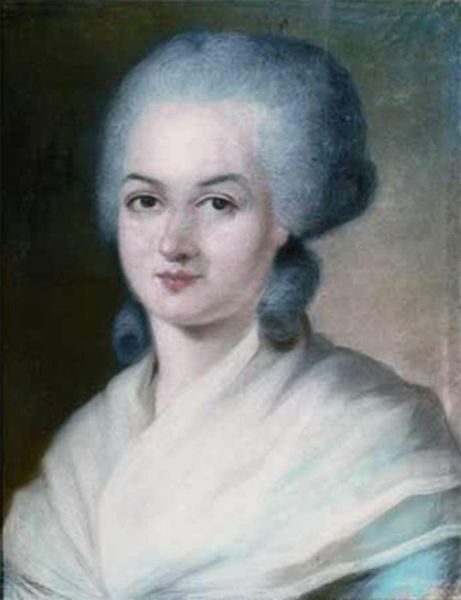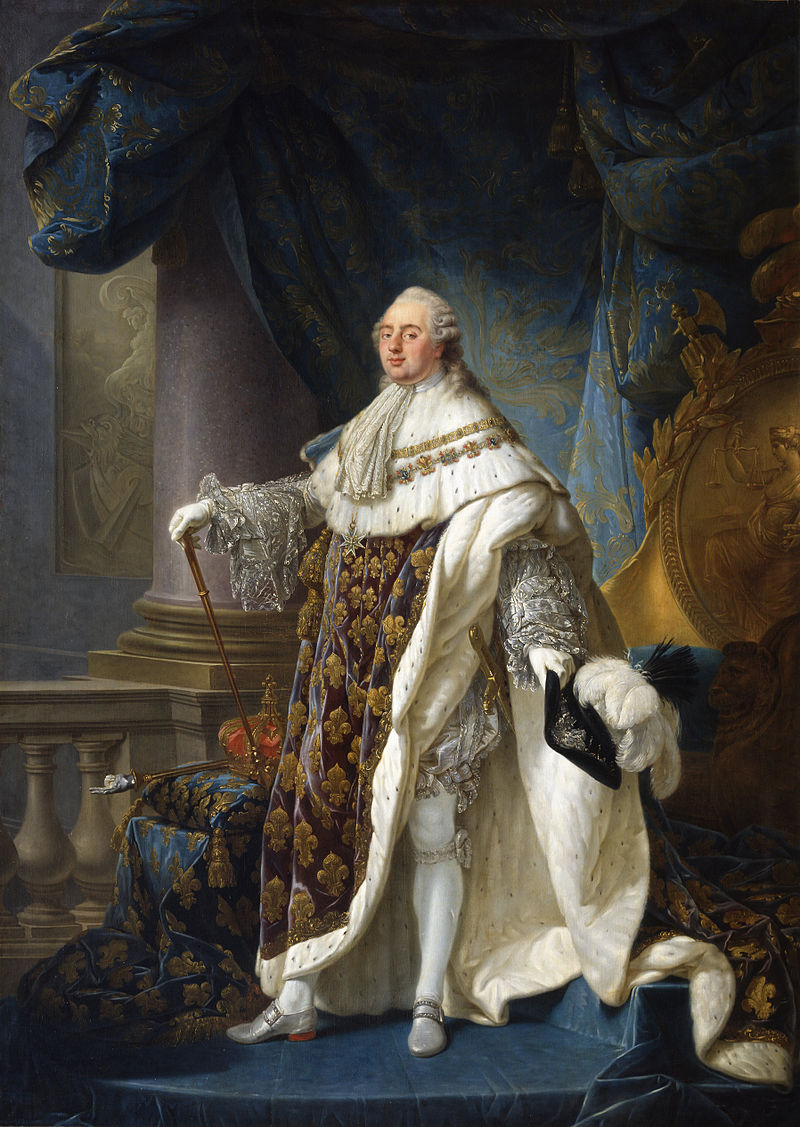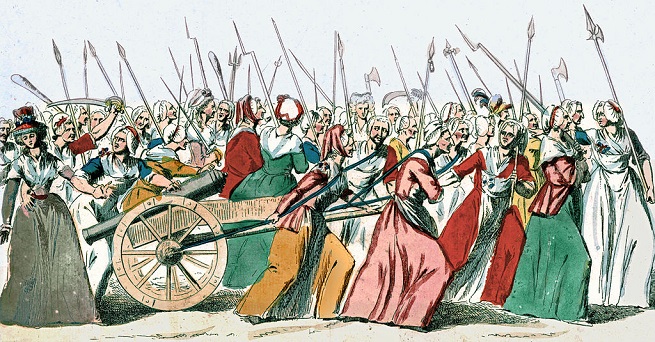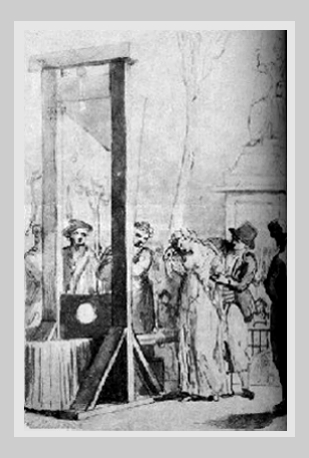The Crest of the Wave: Olympe de Gouges and Early Feminism in France


- SUBSCRIBE
- ALREADY SUBSCRIBED?
BECOME A BONJOUR PARIS MEMBER
Gain full access to our collection of over 5,000 articles and bring the City of Light into your life. Just 60 USD per year.
Find out why you should become a member here.
Sign in
Fill in your credentials below.

Olympe de Gouge by Alexander Kucharsky [Public domain], via Wikimedia Commons
The history of feminism offers a rich chronicle of the social, ideological, and political movements whose goal is securing equal rights for women. Long before what is considered the First Wave of Feminism of the 19th century, there was one French woman whose singular voice not only argued for equality between the sexes, but against injustice, discrimination, and oppression in all its forms. That woman was Olympe de Gouges, who believed women should be allowed a worthwhile role in society, and called for reasonable divorce laws to protect them and their children from impoverishment. She vehemently opposed slavery and the death penalty. She discovered her political voice by writing over 40 works: essays, manifestos, literary treatises, political pamphlets and socially conscious plays that highlighted her strong conviction that the power of drama could encourage political change. She never let the bigotries of her time, the aspersions cast by her critics, or the dangers implicit in being outspoken during the French Revolution’s Reign of Terror (1793-1794), silence her. She was guillotined in Paris on the 3rd of November, 1793 at the age of 45.
Born in 1748, in the southwestern French city of Montauban, Marie Gouze was the youngest of Pierre Gouze and Anne-Olympe Mouisset’s four children. Throughout her life she believed her real father was Jean-Jacques Le Franc, the Marquis de Pompignan, Chief Justice of Montauban, who was rumored to have been her mother’s lover. He was also a man of letters who published a considerable output of plays, poems, literary criticism, essays and highly regarded English translations of the classics. Conceding to the mores of her day, Marie was married at the age of 17 to an innkeeper, Louis-Yves Aubry. They had one son, Pierre, before she was widowed.
By the age of 22, Marie was admired as one of the most beautiful, intelligent and spirited women in Montauban. Without any viable prospects for her future, she decided to move to Paris with her son, reinventing herself as “Olympe de Gouges”. Even though she could not lay claim to her biological father’s name or heritage, she established herself within the fixed Parisian social hierarchy as a widow of noble origins. According to her biographer, Olivier Blanc, she met a wealthy man, Jacques Biétrix de Rozières, with whom she had a long relationship. Through this association, she was received into the many artistic, philosophical and literary salons that espoused the ideas of the Enlightenment, which synthesized the virtue of being a rational, thinking individual with a compassionate soul and ethical conscience regardless of gender, race or rank in society. These ideals based on natural justice, eventually merging with the French citizenry’s demand for liberty and equality, profoundly impacted Olympe and formed the foundation of her political activism.

Montauban, the birthplace of Olympe de Gouges, photo: BastienM via Wikimedia Commons
It was after attending one of the literary salons of the Marquise de Montesson (the morganatic wife of the Duc de Orléans) that Olympe was invited to the Comédie- Française. After a night at the theater, patrons often met at the gambling tables of the Palais Royal, owned by the Duc du Orléans, to engage in lively, opinionated discussions about provocative issues of the times. Freedom of thought was routine. There she met the writer, Louis Sébastian Mercier (1740-1814), who became one of her closest friends. As kindred spirits, they philosophized about everything: not just literature and politics, but the meaning of being, life after death and the transmigration of souls. Both believed the mind was neutral, neither male nor female. Olympe evolved into a staunch critic of the principles of equality and she worked to claim the rightful place of slaves and women within its protection.
Over the remaining nine years of her life, Olympe became engaged in almost any matter she believed involved injustice. By 1784, the year of Marquis de Pompignan’s death, she felt ready to carry on the intellectual legacy of her putative biological father. Her first play, an anti-slavery drama, was accepted by the Comédie-Française and produced as “L’Esclavage des Nègres“, Slavery of the Negroes, written in protest of the government which wanted to abolish slavery in France, but not in its colonies. At the premiere abolitionists and supporters of colonialism started fist fights and the play was quickly cancelled. By writing numerous plays about the topics of slavery and women’s rights, the issues she brought up were spread not only through France, but also throughout Europe and the newly created United States of America.
France’s costly involvement in the American Revolution and extravagant spending by King Louis XVI (1754-1793) and his predecessors, had left the country on the brink of bankruptcy while most of its citizens languished in poverty. A number of lean harvests led to widespread hunger and starvation, and the ever-constant threat of epidemics resulted in a tinderbox situation. In May of 1789 the King called a meeting of the Estates General (representatives of the three estates: the clergy, the nobility, and commoners) in order to resolve the French monarchy’s financial crisis by the most expedient means possible – the raising of taxes. But the meeting ended in conflict because the nobility and clergy refused to pay their fair share of taxes. By doing so they destabilized an already fragile society and increased the political anxiety of the common people. When they were barred from attending the next Estates General meeting in June, it was the last straw. By the first week of July they had formed the National Constituent Assembly and became the effective government of France.

King Louis XVI by Antoine-François Callet, photo: [Public domain], via Wikimedia Commons
Never too shy to express her opinion, Olympe was convinced that the voice of a fair minded person should be heard. She turned to the King, submitting her own proposals on how poverty among the people could be alleviated by instituting a taxation plan that would enable wealth to be fairly divided. She depleted her own assets printing brochures to further her ideas, but it was too late. The Bastille fell a week later, signaling the beginning of the French Revolution. As a passionate advocate of human rights, Olympe welcomed the Revolution with hope, but her dream of an enlightened humanity were soon quashed by the harsh realities of war.
In August, the National Constituent Assembly adopted a new constitution that included “The Declaration of the Rights of Man and the Citizen”, but it was only a statement of vision, and embodied ideals and aspirations towards which France’s acting government pledged resolution in the future. The Declaration did nothing to impact the daily lives of ordinary citizens and by the morning of October 5th, women in the marketplaces of Paris were near rioting over the scarcity and high price of bread. Their demonstrations quickly became intertwined with the activities of the revolutionaries. The market women and supportive allies quickly grew into a mob of thousands. Encouraged by revolutionary agitators, they ransacked the city armory for weapons and marched the 12 miles to the Palace of Versailles. The crowd besieged the palace, and in a dramatically violent confrontation, successfully forced their demands upon the King, who soon was removed and a series of representative governments established.
The women’s march was a defining event, its impact on par with the fall of the Bastille, and would stand throughout history as an inspirational example, emblematic of the power of popular movements. The decisive invasion of the Palace itself removed forever the aura of invincibility that once shielded the monarchy. It marked the end of the King’s resistance to reform. Thereafter, he made no further attempts to push back the tides of change. As one historian wrote, it was “a defeat of royalty from which they never recovered”. However, the leaders of the Revolution failed to recognize that women were the largest force in the march for change. In September 1791, the Assembly proclaimed another revised version of the constitution, but there was no revision of the Declaration of the Rights of Man and the Citizen, and therefore no inclusion of the equality of men and women under the law.

An illustration of the Women’s March on Versailles, 5 October 1789 photo: [Public domain], via Wikimedia Commons
In December 1792, when the King was about to be put on trial, Olympe wrote to the National Assembly offering to defend him, causing outrage among many deputies. In her letter she argued that he was guilty as a king, but innocent as a man, and that he should be exiled rather than executed. The deputies ignored her offer. As the Revolution continued, thousands of men’s, women’s and children’s lives were lost under the blade of the guillotine, as well as the King’s and Queen’s. In the volatile situation that surrounded her, Olympe became more and more vehement in her writings, calling for the sovereignty of the people. In her essay, “The Three Urns”, she demanded that the people be given a choice among three potential forms of government: first, unitary republic, second, a federalist government, or third, a constitutional monarchy. She was soon arrested for seditious behavior.
Olympe spent the next three months in prison without an attorney, trying to defend herself. The presiding judge denied her the legal right to a lawyer on the grounds that she was more than capable of representing herself. Though the Revolutionary leaders were in no mood to tolerate any opposition from intellectuals, she managed to publish two more texts: “Olympe de Gouges at the Revolutionary Tribunal”, wherein she related her interrogations, and her last work, “A Female Patriot Persecuted”, condemning the Reign of Terror. She famously said, “Real change will only occur in the future, when all women will be consumed by their deplorable fate and become aware of their rights in this society.” She was sentenced to death on November 2, 1793, and executed the following day, one of the few women executed for her political writings.

Olympe de Gouges at the guillotine photo: via Wikimedia Commons
Olympe de Gouges’s last moments were paraphrased by an anonymous Parisian: “Yesterday, at seven o’clock in the evening, a most extraordinary person who held the imposing title of woman of letters, was taken to the scaffold… She had thrown herself in the Revolution, body and soul. But having quickly perceived how atrocious the system adopted was, she chose to unmask the villains through her words. They never forgave her, and she paid for her carelessness with her head.”
After her death, according to her biographer, her son, General Pierre Aubry de Gouges moved to Guyana with his wife and five children. He died in 1802, after which his widow attempted to return to France, but died aboard the ship during her voyage home. In Guadeloupe, the two young daughters were married: Marie Hyacinthe Geneviève de Gouges to an English officer (Captain William Wood), who subsequently settled in Tasmania, and Charlotte de Gouges to American politician Robert Selden Garnett, a member of the United States Congress, who had plantations in Virginia. Hence, many Australian and American families have Olympe de Gouges as an ancestor.
On 6 March 2004, in Paris, the junction of the Rues Béranger, Charlot de Turenne, and Franche-Comté, was proclaimed Place Olympe de Gouges. The square was inaugurated by the mayor of the 3rd arrondissement, Pierre Aidenbaum, along with the first Deputy Mayor of Paris, Anne Hidalgo. The actress Véronique Genest read an excerpt from the Declaration of the Rights of Woman.

La place Olympe de Gouges in Paris, photo: Ralf.treinen, via Wikimedia Commons
The 2007 French presidential contender, Ségolène Royal, expressed the wish that the remains of Olympe de Gouges be moved to the Panthéon. However, her remains, like those of the other victims of the Reign of Terror—were lost through burial in communal graves. She was not the choice of François Hollande, for entrance to the Pantheon in 2015. He preferred four resistance fighters, including two women. However, a marble bust of Olympe de Gouge was placed in the Salle des Four-Colonnes of the National Assembly. Ironically, she is the first woman to enter this assemblage of the great political figures who formed modern day France.
In pre-revolutionary France women were considered second class citizens, and they remained so under Napoléon. They didn’t receive the vote until 1945, over 150 years later. Though Olympe was not one of the most militant activists on par with Charlotte Corday or Manon Roland, she set the precedent for future generations of feminist writers.
Lead photo credit : Olympe de Gouge by Alexander Kucharsky [Public domain], via Wikimedia Commons



REPLY
REPLY
REPLY
REPLY
REPLY
REPLY
REPLY